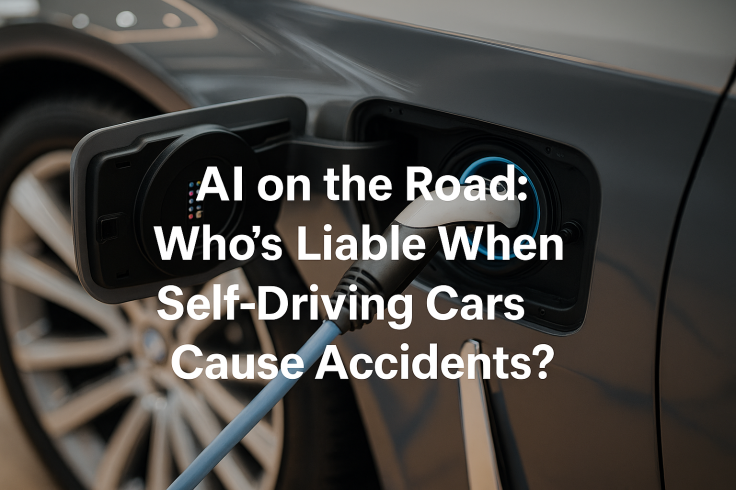
Let's be blunt: if a self-driving car hits you, you're not just up against a negligent driver; you're up against a web of tech companies, software updates, and legal grey zones. And unless you understand who's legally at fault, your personal injury claim could stall before it even starts.
With autonomous vehicles (AVs) rolling into cities and highways across the U.S., we're not just rewriting traffic laws—we're rewriting accountability itself. Here's what you need to know if a robot car wrecks your life.
The Legal Battlefield: Where Tech Meets Liability
First, the obvious problem: federal law hasn't caught up. There's no unified national playbook for AV accidents, so the rules change by state.
The National Highway Traffic Safety Administration (NHTSA) has tried to fill the gap. In December 2024, it introduced the Automated Vehicles Safety Transparency and Evaluation Program (AV STEP)—a voluntary system to collect crash data from self-driving cars. Great for long-term safety? Sure. But for everyday people injured today, it doesn't solve much.
So when things go wrong, state laws decide the outcome, and they're still adjusting the rules in real time.
Who's on the Hook in a Self-Driving Car Accident?
Unlike traditional crashes, where one person rear-ends another, AV collisions raise tougher questions: Was it a hardware glitch? Bad code? Human error? Here's a breakdown of who could be liable—and why.
1. Manufacturers and Software Developers
If your accident was caused by a design flaw—like a sensor that failed to detect a pedestrian, or software that misjudged a red light—the company behind the car can be sued under product liability laws. This includes both hardware and software malfunctions.
Example: If a Tesla's autopilot system accelerates into a stopped vehicle, Tesla could be directly responsible, not just the owner.
2. Vehicle Owners
Not all AVs are fully autonomous. In Level 2 or 3 systems, humans are still expected to take the wheel when prompted. If a driver ignores those alerts, they could share the lame.
Translation? Owning a robot car doesn't make you immune to responsibility. You still have to pay attention.
3. Third-Party Service Providers
Did a bad map or outdated data lead the car into a construction site? If a data provider, maintenance company, or AV fleet manager dropped the ball, they could be held liable, too.
In short, accidents in AVs often involve multiple parties, which means your personal injury claim must be precise, evidence-backed, and fast.
But Wait — What About Your Data?
Self-driving cars don't just move—they watch, store, and transmit everything. From where you go to how you drive, AVs collect vast amounts of personal data.
And that opens another can of legal worms.
In January 2025, the Federal Trade Commission (FTC) cracked down on General Motors for sharing geolocation and behavioral data without proper consent. That's not just shady—it's illegal.
So now we're talking about two layers of risk:
- Physical injury from a crash
- Privacy violations that expose your data
If you're in an accident, ask your lawyer what data was collected—and how it may help (or hurt) your case.
Filing a Personal Injury Claim After a Self-Driving Car Crash
Let's get practical. If you've been hurt by a self-driving vehicle, time is everything. The statute of limitations varies by state, but most give you two to three years to take legal action. Don't waste a second.
Here's what to do:
- Document the scene — Take photos, note vehicle behavior, and get witness statements.
- Get medical help immediately — Delays can hurt both your recovery and your case.
- Request vehicle data logs — These are critical in proving fault.
- Contact a lawyer who handles tech-related injury claims — This is not your typical fender-bender case.
Don't assume the process is the same as with regular crashes. It's not. For those involved in traffic incidents, this guide on how to file a personal injury claim can clarify the steps needed to pursue legal action and help you avoid critical mistakes.
The Future of AV Law: Still Under Construction
The truth? We're not ready.
The technology is moving faster than the laws, and that gap creates risk—for victims, consumers, and yes, even the companies making these cars.
If we want the AV revolution to succeed, we need clarity, accountability, and strong protections. That means:
- Clear liability standards
- Strong data privacy laws
- Legal support for everyday people
Because right now, self-driving technology is driving blind, legally speaking.
Final Word: Know Your Rights Before the Road Knows You
A crash involving an autonomous vehicle isn't just an accident—it's a legal maze. And if you're not equipped to navigate it, you could miss out on compensation for your injuries, pain and suffering, or lost wages.
Don't guess. Don't wait. If you or someone you love has been hurt, talk to a personal injury attorney who understands this evolving legal landscape—and knows how to fight big tech on your behalf.
Because in the age of smart cars, you still need smart legal help.









